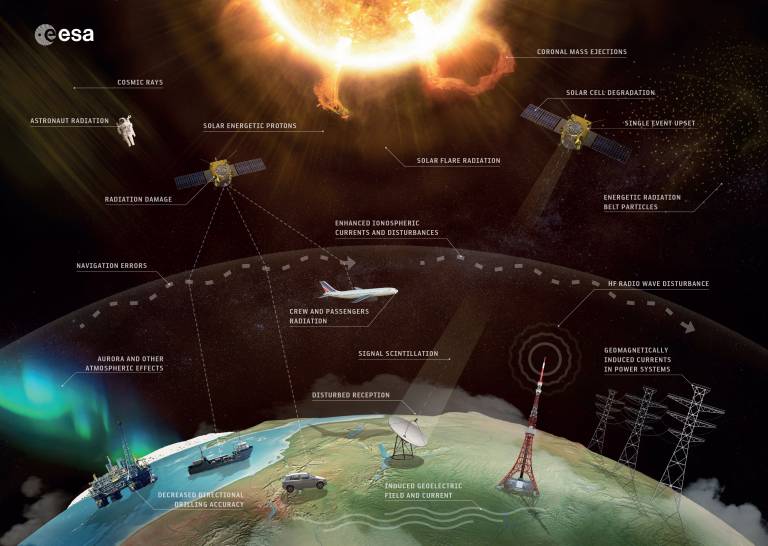Innovative space weather monitoring projects receive UKRI funding
8 July 2020
Academics and Researchers from UCL Department of Space and Climate Physics at the Mullard Space Science Laboratory are amongst those to receive funding for projects focused on improving the UK’s capability to predict and mitigate the hazards of space weather.

The projects are part of the first phase of the Space Weather Instrumentation, Measurement, Modelling and Risk (SWIMMR) programme, a £20 million, four-year programme led by the Science and Technology Facilities Council (STFC) with the Natural Environment Research Council (NERC). This funding covers five projects, three of which have involvement from UCL staff, and are led by Dr Colin Forsyth, Dr Jonathan Rae and Professor Lucie Green.
Space radiation can have a significant effect on aircraft systems, communications and satellite orbits, as well as surges in the current of power grids and other ground-level systems. These are significant risks to the infrastructers that we rely on in daily life. Predicting these events should allow for earlier warnings and advice, allowing more time to take necessary action such as manouvering satellites and isolating parts of the power network to reduce disruption.
Science Minister Amanda Solloway said; “Satellites are fundamental to our everyday lives, underpinning technologies we constantly rely on from mobile phones to GPS. Any disruptions caused by space weather can therefore have a profound impact on businesses and individuals. These fantastic projects that we are backing today will enhance the UK’s ability to forecast space weather, enabling our excellent national weather service to defend the technologies we all depend on.”
The five projects receiving funding each focus on a different area of forecasting related to space radiation. Staff from the UCL Department of Space and Climate Physics at the Mullard Space Science Laboratory are involved with projects N1, N2 and N4 - Satellite risk, Aviation risk and Ground effects respectively. They will be working alongside coilleagues from Imperial College, University of Sheffield, University of Reading, University of Central Lancashire and the NERC British Geological Survey. Funding has also been provided for projects N3 and N5 on forecasting GNSS and HF aviation, and Satellite drag.
Simon Machin, Space Weather Programme Manager at the Met Office, said; “We are very excited by the prospect of working with the crème of UK science and academia on the SWIMMR projects. SWIMMR will deliver a step change in UK space weather monitoring, warning and prediction capability by supporting pull-through of cutting-edge science into operational services. This will enable the Met Office to provide a greater range of more accurate services driven by the needs of users and underpins the UK’s strategic aims to grow and exploit opportunities in the space domain. SWIMMR communicates a clear vision of cementing the UK as a world leader in space weather and our thanks go out to all partners and stakeholders for supporting this programme of work.”
Two of these projects - N2 on Aviation risk forecasting, and N4 on Ground effects forecasting - follow on from two NERC Highlight topics worth over £5M combined. These projects were "Modelling the acceleration, transport and loss of radiation belt electrons to protect satellites from space weather" (Rad-Sat), and "Space Weather Impact on Ground-based Systems" (SWIGS). Additional information about these projects, and the new research, can be found at the links below
Links:
- Full story on the Met office website
- SWIMMR programme
- Mullard Space Science Laboratory
- Rad-Sat project
- SWIGS project
- Professor Lucie Green's academic profile
Image:
Space Weather Effects - Credit ESA/Science Office, CC BY-SA 3.0 IGO
 Close
Close

